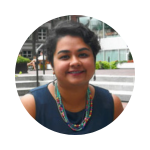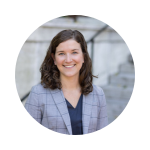The Gender Action Portal's research translation work could not be done without the hard work of our team of technical writers, content editors, and interns.

Anisha Asundi
Director of Programs and Research, WAPPP
Harvard Kennedy School
anisha_asundi@hks.harvard.edu
Anisha Asundi (she/her/hers) is a racial and gender justice advocate and higher education professional who is passionate about advancing evidence-based diversity, equity, and inclusion. She is currently the director of research and programs at the Women and Public Policy Program (WAPPP) at Harvard Kennedy School where she leads WAPPP's research portfolio, including the Gender Action Portal, a collection of research evaluating the impact of specific policies, strategies, and organizational practices to advance gender equity. She also serves as a co-chair and consultant to the Culture Ambassadors program at HKS, which is a train-the-trainers program aiming to advance anti-racism and build a sense of belonging for HKS staff. Her research and practical work lie in the foundations of anti-oppression and social justice organizing - particularly in amplifying the voices and lived experiences of marginalized groups (such as women, people of color, LGBTQ communities, and working-class populations). She holds an MPH with a concentration in Health Disparities from Boston University and a BA from Skidmore College.
 Sara Rahman
Sara Rahman
Technical Writer
Harvard Kennedy School
Sara Rahman is a researcher hailing from Kuala Lumpur, Malaysia and a current master's in public policy student at the Harvard Kennedy School. Prior to Harvard, Sara worked in the criminal justice and education research units in the New South Wales state government in Australia. Sara has a Bachelor of Economics (Honours) degree from the University of Sydney.
There are many public and private arenas where women are disadvantaged because of structural barriers, implicit bias, and sometimes, the unintended effects of policy. The work at GAP is impactful because it helps policymakers learn about and adopt evidence-based solutions to address different barriers to gender equity across a broad range of policy areas. Coming from a policy research background, I also find learning about how rigorous evaluation is conducted in reducing gender gaps in different policy areas.
 Julia Long
Julia Long
Technical Writer
Harvard Kennedy School
Julia Long is a Technical Writer for the Gender Action Portal and master's in public policy candidate at the Harvard Kennedy School. Her interest in evidence-based programs to close gender gaps stems from her previous work in research at the Urban Institute Health Policy Center, where she helped launch a national reproductive health survey. She holds a Bachelor of Science in Public Health (BSPH) in health policy and management from the University of North Carolina at Chapel Hill.
To me, advancing gender equity means not only repairing harms, but preventing them for the next generation. The work of GAP is meaningful to me because it shows that we have strategies we can use right now, across a variety of sectors, to close gender gaps and ensure a safer and more prosperous world for women.
 Erin Shirtz
Erin Shirtz
Content Editor
Harvard Business School
Erin is a doctoral student in the Organizational Behavior program at Harvard Business School. Her research broadly examines gender inequality at work with a focus on how technology transforms social identities and workplace relationships. Before joining the Harvard community, she conducted research on diversity, equity, and inclusion at the University of Chicago Booth School of Business.
With my background in organizational research, I am especially driven to improve gender equality at work. To close the gender gap, practitioners need to know which policies, strategies, and processes to institute. GAP plays a critical role, bridging the gap between evidence-based research and actionable solutions. Through GAP, I aim to make research accessible and approachable to support the practical changes needed to advance gender equity on the ground.
 Siri Hollowitch
Siri Hollowitch
GAP Intern
Bentley University
Siri Hollowitch is a senior at Bentley University studying Public Policy with minors in Law and Business Studies. Prior to joining GAP, she conducted research on pay equity and diversity in government hiring practices with Inclusive America in Washington, D.C. Siri is passionate about leveraging research to drive policy solutions and legislation that fosters economic empowerment for women.
In any attempt to advance gender equity, efforts must prioritize marginalized identities and be grounded in research. GAP effectively addresses these aspects, distilling complex research on gender equity and intersectionality for those positioned to influence public policy. Since much of this research is typically geared toward academic audiences, GAP's role in making it accessible is crucial for driving meaningful change.
Since GAP launched in 2014, many staff, writers, editors, and interns have worked on this important and impactful resource that translates research into action. GAP would not be in existence without the vision and tireless dedication of longtime GAP Manager Anisha Asundi. We also extend our special thanks to Lameya Ahmed, Jessica Angel, Sara Arman, Aimee Bell-Pasht, Abigail Bliss, Danielle Boudrow, Sophie Bravo, Sunaina Chatterjee, Siri Chilazi, Kerry Conley, Cici Coquillette, Mayumi Cornejo, Elizabeth Good, Shanelle Chambers Haile, Sarah Jacobs, Jackie Jahn, Joshua Jeong, Jessica Lieberman, Grace Liu, Heidi Liu, Inmaculada Macias-Alonso, Giovana Rodrigues Manfrin, MaryRose Mazzola, Lucy McSweeney, Leah Meadows, Danni Melton, Supriya Misra, Denisse de la Peña, Safira Putri, Sahitya Raja, Snigdha Shahi, Sreela Srinivasan, Merrit Stüven, Laura Chang Tourtellotte, Blair Uhlig, and Tina Wei.
Note: If you worked or interned for GAP and aren’t listed here, we apologize! Please let Anisha know and we will add you to the list.